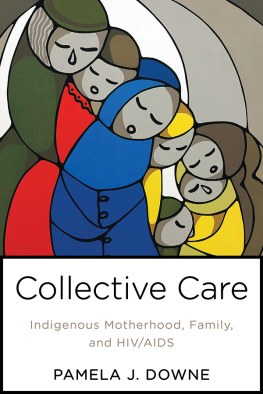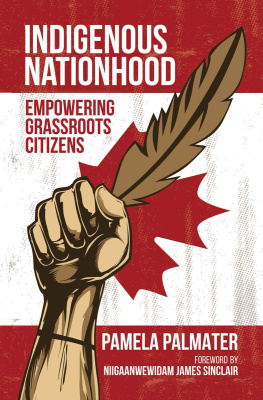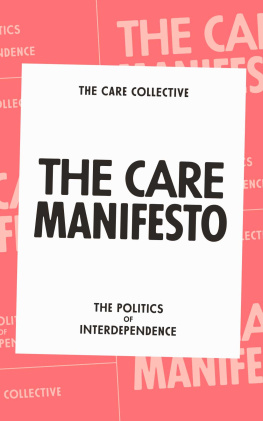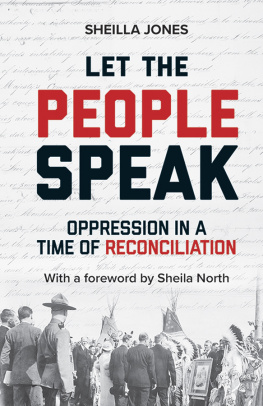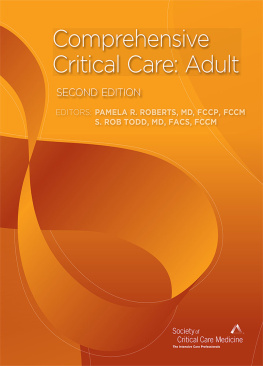Pamela Downe - Collective Care: Indigenous Motherhood, Family, and Hiv/AIDS
Here you can read online Pamela Downe - Collective Care: Indigenous Motherhood, Family, and Hiv/AIDS full text of the book (entire story) in english for free. Download pdf and epub, get meaning, cover and reviews about this ebook. year: 2020, publisher: University of Toronto Press, genre: Home and family. Description of the work, (preface) as well as reviews are available. Best literature library LitArk.com created for fans of good reading and offers a wide selection of genres:
Romance novel
Science fiction
Adventure
Detective
Science
History
Home and family
Prose
Art
Politics
Computer
Non-fiction
Religion
Business
Children
Humor
Choose a favorite category and find really read worthwhile books. Enjoy immersion in the world of imagination, feel the emotions of the characters or learn something new for yourself, make an fascinating discovery.
- Book:Collective Care: Indigenous Motherhood, Family, and Hiv/AIDS
- Author:
- Publisher:University of Toronto Press
- Genre:
- Year:2020
- Rating:4 / 5
- Favourites:Add to favourites
- Your mark:
- 80
- 1
- 2
- 3
- 4
- 5
Collective Care: Indigenous Motherhood, Family, and Hiv/AIDS: summary, description and annotation
We offer to read an annotation, description, summary or preface (depends on what the author of the book "Collective Care: Indigenous Motherhood, Family, and Hiv/AIDS" wrote himself). If you haven't found the necessary information about the book — write in the comments, we will try to find it.
This engaging ethnography explores how Indigenous women and their communities practice collective care to sustain traditional lifeways in what has been called Canadas HIV hot zone.
Pamela Downe: author's other books
Who wrote Collective Care: Indigenous Motherhood, Family, and Hiv/AIDS? Find out the surname, the name of the author of the book and a list of all author's works by series.
Collective Care: Indigenous Motherhood, Family, and Hiv/AIDS — read online for free the complete book (whole text) full work
Below is the text of the book, divided by pages. System saving the place of the last page read, allows you to conveniently read the book "Collective Care: Indigenous Motherhood, Family, and Hiv/AIDS" online for free, without having to search again every time where you left off. Put a bookmark, and you can go to the page where you finished reading at any time.
Font size:
Interval:
Bookmark:

COLLECTIVE CARE
Collective Care
Indigenous Motherhood, Family, and HIV/AIDS
Pamela J. Downe

UNIVERSITY OF TORONTO PRESS
Toronto Buffalo London
University of Toronto Press 2021
Toronto Buffalo London
utorontopress.com
Printed in Canada
ISBN 978-1-4875-8764-2 (cloth) | ISBN 978-1-4875-8765-9 (EPUB) |
All rights reserved. The use of any part of this publication reproduced, transmitted in any form or by any means, electronic, mechanical, photocopying, recording, or otherwise, or stored in a retrieval system, without prior written consent of the publisher or in the case of photocopying, a licence from Access Copyright, the Canadian Copyright Licensing Agency is an infringement of the copyright law.
Library and Archives Canada Cataloguing in Publication
Title: Collective care : Indigenous motherhood, family, and HIV/AIDS / Pamela J. Downe.
Names: Downe, Pamela, 1964 author.
Series: Teaching culture.
Description: Series statement: Teaching culture: UTP ethnographies for the classroom | Includes bibliographical references and index.
Identifiers: Canadiana (print) 20200341901 | Canadiana (ebook) 2020034224X | ISBN 9781487587642 (hardcover) | ISBN 9781487587635 (softcover) | ISBN 9781487587659 (EPUB) | ISBN 9781487587666 (PDF)
Subjects: LCSH: HIV-positive women Saskatchewan Social conditions Case studies. | LCSH: HIV-positive persons Saskatchewan Social conditions Case studies. | LCSH: Indigenous women Health Saskatchewan Case studies. | LCSH: Mothers Health Saskatchewan Case studies. | LCSH: HIV infections Social aspects Saskatchewan Case studies. | LCSH: Health planning Saskatchewan Case studies. | LCSH: Social medicine Saskatchewan Case studies.
Classification: LCC RA643.86.C22 S23 2021 | DDC 614.5/993920082097124 dc23
We welcome comments and suggestions regarding any aspect of our publications please feel free to contact us at .
Every effort has been made to contact copyright holders; in the event of an error or omission, please notify the publisher.
University of Toronto Press acknowledges the financial assistance to its publishing program of the Canada Council for the Arts and the Ontario Arts Council, an agency of the Government of Ontario.

Contents
Journalist Sonia Shah (2016, 8) quotes UCLA infectious disease expert Brad Spellberg: You hear that we have to win the war against microbes. Really? They are so numerous that they outweigh us by one-hundred-thousand fold. Win the war? I dont think so. Medical anthropologists and public health scientists are often called on to speak publicly about global health wars and victories. COVID-19, Ebola, Zika, and monkeypox are recent headline-grabbing outbreaks, as is the resurgence of measles, bubonic plague, and polio. These epidemics are emerging alongside one of the deadliest and longest pandemics in human history: human immunodeficiency virus and acquired immunodeficiency syndrome (HIV/AIDS). The World Health Organization estimates that since HIV was first identified in the early 1980s, some seventy million people have been infected with it, and thirty-five million have died from HIV/AIDS-related causes.
There are families affected by every one of these infections and deaths. Except for some groundbreaking studies see Hunleth (2017) and Block and McGrath (2019) there is not much known about these families. This book addresses this lack by exploring the family dimensions of the HIV/AIDS epidemic on the Canadian prairies, working in partnership with Indigenous mothers. The ethnographic story that unfolds in the coming chapters is one of HIV-related suffering and stigma as well as community strength. It is grounded in the local context of central and northern Saskatchewan, Canada. However, given that Canadas colonial history of hostility towards Indigenous Peoples is one that is shared by peoples of other colonized lands, and that Saskatchewan has drawn national and global attention for having HIV/AIDS rates on par with Rwanda and Nigeria, this local story has global relevance.
I advance the central argument that despite the idealized models of individual motherhood that dominate this neoliberal moment in North American society, collective care is the cultural touchstone for Indigenous mothers and their families living with, and affected by, HIV/AIDS. Collective mothering, however, draws harsh criticism from individual service providers, teachers, and law enforcement officers, as well as the broader public. Accusations of irresponsibility, inability, and a lack of maternal love are commonly made. Still, the ethic for collective care endures in spite of such criticism, providing support in times of duress and ill health. Thirty women and twenty-three men invested their time, trust, and stories in the project on which this book is based. They consistently and clearly claimed that raising healthy, resilient, responsible, and proud children requires a network of kin a mom team as one participant called it.
Conducting anthropological research and writing a book also requires a team, and I will be forever grateful to those who contributed to this work. First and absolutely foremost, I thank AIDS Saskatoon staff and the people who access their services. This agency does heroic work. There is great loyalty to the agency among the people who access its services, and deservedly so. In my fifteen years of partnership with AIDS Saskatoon, we have completed five projects and I have had the pleasure of working with Jason Mercredi, Natalie Kallio, Cheryl Antoine, Christine Bennett, Erin Beckwell, and Heather Byrne. I owe particular thanks to the staff members who were directly involved in formulating and conducting the research on which this book is based: Gina McKay, Nicole White, Duane Minish, Cathy Johnson, Megan Morman, Andrea Kotlar-Livingston, and above all Sherri Doell and Eleanor Prosper. The members of the Community Advisory Board who represented fourteen organizations that provide Indigenous and health services to those affected by HIV/AIDS offered invaluable insight and guidance. Special gratitude is owed to Janine Cardinal for her wisdom, guidance, and fearlessness. I cannot identify the research participants by name, and pseudonyms are used throughout this book; however, nothing here would be possible without their trust, enthusiasm, and ongoing input. Any royalties from the sale of this book will go to AIDS Saskatoon to support all that they do. Thank you, all.
Second, I want to recognize that the research on which this book is based was supported by a grant from the Canadian Institutes for Health Research, as well as funding from the National Network of Aboriginal Health.
Third, I am extremely appreciative of my academic collaborators and colleagues who contributed to and supported this research. The core research team consisted of University of Saskatchewan colleagues and friends Sylvia Abonyi (Community Health and Epidemiology), Karen Lawson (Psychology), and Jennifer Poudrier (Sociology). It has been a privilege to work with some stellar students on this project: Katherine Shwetz, Sarah York, Zachari Logan, Jody Shynkaruk, Melanie Bayly, Mitchell Anderson, Rachael Lammie, Mika Rathwell, Andrea Epp, Morgan McAllister, and Rebecca Dravland. I am very grateful to Debbie Croteau, the administrative assistant in the Department of Archaeology and Anthropology, for her assistance in administering the financial aspects of this work. The Department of Anthropology at the University of California (Los Angeles) was my home away from home in 2005 and 2010 when I was fortunate to hold visiting scholar status there. The interest in and feedback on my work from UCLAs Linda Garro, Carole Browner, Jason Throop, and all the students associated with the Mind, Medicine, and Culture seminar, as well as the Center for Everyday Lives of Families (CELF), were invaluable. I also want to express my deepest thanks to my colleagues, graduate students, and friends who were not directly involved in this project but who nevertheless supported it by attending fundraisers, public presentations, AIDS Saskatoon events; and by providing advice, feedback, and support when I needed it most: Angela Lieverse, Margaret Kennedy, Colleen Dell, Christine Chang, Jim Handy, Annette Desmarais, Linda McMullen, Allison Muri, Ray Stephanson, Ron Cooley, Clint Westman, David Bennett, Samantha Moore, Adrienne Ratuschniak, Janice Graham, Robin Whitaker, Michel Bouchard, Peter Stephenson, Susan Frohlick, Penny VanEsterik, and Jamil Sawaya.
Next pageFont size:
Interval:
Bookmark:
Similar books «Collective Care: Indigenous Motherhood, Family, and Hiv/AIDS»
Look at similar books to Collective Care: Indigenous Motherhood, Family, and Hiv/AIDS. We have selected literature similar in name and meaning in the hope of providing readers with more options to find new, interesting, not yet read works.
Discussion, reviews of the book Collective Care: Indigenous Motherhood, Family, and Hiv/AIDS and just readers' own opinions. Leave your comments, write what you think about the work, its meaning or the main characters. Specify what exactly you liked and what you didn't like, and why you think so.

